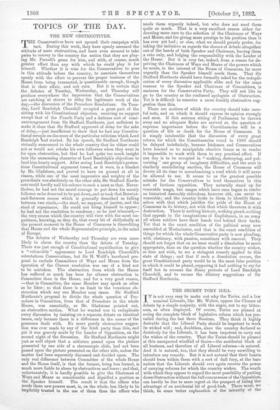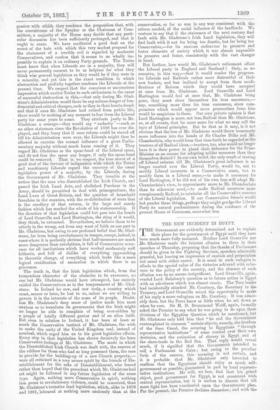THE SECRET TORY IDEA.
'IT is not very easy to make out why the Tories, and a few nominal Liberals, like Mr. Welter, oppose the Closure of debate by a simple majority, with the anger, not to say bitter- ness, so often displayed. Of course, Tories are pleased at seeing the complete block of legislative reform which has pre- vailed during the last three Sessions. They think it highly desirable' that the Liberal Party should be impotent to work its wicked will ; and, doubtless, since the country declared so decisively for the Liberals, it has been impotent to carry out the wishes of the country. That the Tories should be pleased at this unexpected windfall of theirs—the accidental block of all business, and therefore of all Liberal reforms—is natural. And it is natural, too, that they should be very unwilling te introduce any remedy. But it is not natural that their hearts. should burn within them with a sort of dull fury, at the bare notion that the Liberals should ever again recover the power of carrying reforms for which the country wishes. The wrath with which they appear to regard the mere possibility of putting down Obstruction without the full concurrence of the Opposition, can hardly be due to mere regret at the prospect of losing the advantage of an accidental bit of good-luck. There must, we think, be some better explanation of the intensity of the
passion with which they condemn the proposition that, with the concurrence of the Speaker or the Chairman of Com- mittees, a majority of the House may decide that any parti- cular discussion has been sufficiently prolonged, and that it ought to cease. We have meditated a good deal on the secret of the hate with which this very modest proposal for the abatement of a terrible evil is regarded by moderate Conservatives, and confess that it seems to us wholly im- possible to explain it on ordinary Party grounds. The Tories must know that when Liberals are in a majority, they will never permanently consent to be as helpless for what they think wise general legislation as they would be if they were in a minority, and yet this is the exact condition to which obstruction and prolixity together condemn the Liberals at the present time. We suspect that the conscious or unconscious impression which excites Tories to such erithusiasm in the cause of successful Obstruction is this,—that only during Mr. Glad- stone's Administration would there be any serious danger of fun- damental and critical changes, such as they in their hearts dread; and that if once Mr. Gladstone had retired from public life, there would be nothing of any moment to fear from the Liberal party for some years to come. They attribute justly to Mr. Gladstone a courage—they would say "audacity "—such as no other statesman since the Revolution of 1688 has ever dis- played, and they fancy that if once reform could be staved off till his Administration were over, the Liberals might then be allowed to exercise the normal influence of a great Parlia- mentary majority without much harm coming of it. They regard Mr. Gladstone as the spear-head of the Liberal spear, and do not fear the spear any longer, if only the spear-head could be removed. That is, we suspect, the true secret of a good deal of the fervour of indignation with which the Tories and reactionary Liberals regard the recovery of the usual legislative power of a majority, by the Liberals, during the Government of Mr. Gladstone. They tremble at the notion that the man who disestablished the Irish Church, and passed the Irish Land Acts, and abolished Purchase in the Army, should be permitted to deal with primogeniture, the Land Laws of Great Britain and the question of household franchise in the counties, with the re-distribution of seats that is the corollary of that reform, in the large and manly fashion which has marked the whole of his statesmanship. If the direction of that legislation could but pass into the hands of Lord Granville and Lord Hartington, the sting of it would, they think, be extracted. Nevertheless, we believe them to be utterly in the wrong, not from any want of faith on our part in Mr. Gladstone, but owing to our profound belief that Mr. Glad- stone, far from being revolutionary in temper, except, indeed, in cases where it is perfectly obvious that half-measures are much more dangerous than revolutions, is full of Conservative rever- ence for all institutions which have worked moderately well hitherto, and full of dislike of everything ppproaching to theoretic change, of everything which looks like a mere logical rectification of anomalies in which there is no grievance.
The truth is, that the Irish legislation which, from the tremendous character of the obstacles to be overcome, no one but Mr. Gladstone would have attempted, has entirely misled the Conservatives as to the temperament of Mr. Glad- stone. In Ireland he saw, and saw truly, a country which must, sooner or later, be lost to us, unless we are willing to govern it in the interests of the mass of its people. Doubt- less Mr. Gladstone's deep sense of justice made him most anxious so to transform its government that the Irish might no longer be able to complain of being over-ridden by a people of totally different genius and of an alien faith. But even in relation to Ireland, it has been at least as much the Conservative instinct of Mr. Gladstone, the wish to make the unity of the United Kingdom real, instead of nominal, which urged him on to his great legislative efforts. Every step in that legislation has shown decisively the keen Conservative feelings of Mr. Gladstone. The mode in which the Disestablished Irish Church was dealt with, the reserve of the edifices for those who had so long possessed them, the care to provide for the building-up of a new Church property,— were all criticised in a very severe spirit by the friends of Dis- establishment for the sake of Disestablishment, who feared rather than hoped that the precedent which Mr. Gladstone had set might be followed in any future legislation of the same type. Again, nothing more Conservative in spirit, nothing less prone to revolutionary violence, could be conceived, than Mr. Gladstone's tentative land legislation, which, alike in 1870 and 1881, laboured at nothing more anxiously than at the
conservation, so far as was in any way consistent with the reform needed, of the social influence of the landlords. We venture to say that if the statesmen of the next century find fault with Mr. Gladstone's Irish Land legislation, they will find fault with it not for being too drastic, but for being too Conservative,—for its anxious endeavour to preserve and foster elements of society which it was almost impossible to preserve and foster, consistently with the vast changes in hand.
But further, how would Mr. Gladstone's retirement affect the Liberal party in England and Scotland ? Only, as we conceive, in this way,—that it would render the progress- ive Liberals and Radicals rather more distrustful of their new leaders, and less inclined to accept from them modi- fications of Reform which they would have accepted at once from Mr. Gladstone. Lord Granville and Lord Hartington woald feel at once that, Mr. Gladstone beieg gone, they must show themselves his true successors,— nay, something more than his true successors, since com- promises which would appear mere generosities from him wonld be suspicious in them. Our own private opinion is that Lord Hartington is more, not less, Radical than Mr. Gladstone, or, at all events, that he cares more for what we may call the logic of Liberal principles. But be that as it may, is it not obvious that the loss of Mr. Gladstone would throw immensely more influence into the hands of Sir Charles Dilke and Mr. Chamberlain, who would from that time forth be regarded as the trustees of all Radical ideas,—trustees, too, who would no longer have it in their power to plead their deference for the Prime Minister as an excuse for adopting milder measures than they themselves desired ? In our own belief, the only result of staving off Liberal reforms till Mr. Gladstone's great influence is no longer exerted over the Liberal Party, would be, not to modify Liberal measures in a Conservative sense, but to modify them in a Liberal sense,—to make it necessary for Lord Hartington, if he did not of his own free-will adopt Mr. Chamberlain's view, to approximate more to Mr. Chamberlain. than he otherwise need,—to make Radical measures more conspicuously Radical, to minimise all the Conservative reserves of the Liberal legislation. If our Conservative friends would. but ponder these things, perhaps they might grudge the Liberal Party its natural predominance during the existence of tie present House of Commons, somewhat less.



































 Previous page
Previous page